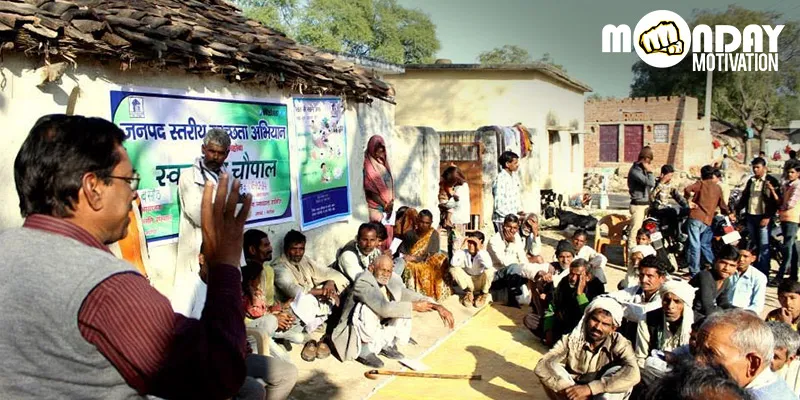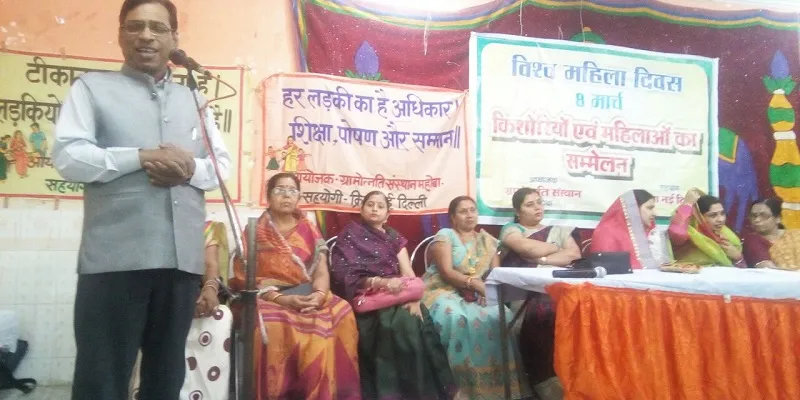Meet Dr Arvind Khare, who is empowering villagers in UP for over three decades
Founded in 1983, Dr Khare’s Gramonnati Sansthan has championed multiple causes to help rural populations in the drought prone areas of Bundelkhand region.

Fragmented landholdings, feudal structures that bred rampant caste discrimination, adverse sex ratio and lower literacy rates were just a few characteristics typical of many villages in the Mahoba districts of Uttar Pradesh. Lying in the Bundelkhand plateau regions, most of these villages reeled with problems such as poverty, lack of infrastructure, high migration, dacoity, etc., when Dr Arvind Khare set out to work in the early 1980s.
“Considered among the poorest districts in UP, Mahoba had a significant population of backward classes like SC/STs,” explains the 61-year-old Ayurvedic doctor. With a mission to acquaint and empower people in rural areas, Dr Khare founded Gramonnati Sansthan, which over the past three decades has changed the lives of many people in over 60 villages of the most populous state in India.
The initial push
While pursuing as bachelor’s degree in Ayurvedic Medicine and Surgery, Dr Khare was much impressed with a famous experiment in community health programme conducted by Magsaysay award winner late Dr Rajnikanth Arole and his wife at Jamkhed in Maharashtra. “It was Dr Arole who inspired me to connect with like-minded people and use my knowledge in the medical field to empower native populations,” recalls Dr Khare.
Motivated by this initial push, he decided to dedicate his life for achieving social good in the villages of Bundelkhand region; hence, Gramonnati Sansthan was started in 1983 to help and uplift the weakest and most vulnerable sections of people.
I first began working in a few selected villages in Mahoba district where I mainly concentrated on spreading health-related awareness through first aid training, educating people on how to use traditional knowledge, benefits of native plants, etc., says Dr Khare, the founder and director of the well-known non-profit.
Gram Swaraj, the real inspiration
Founded on the Gandhian principle of Gram Swaraj (village self-rule), Dr Khare has always been keen on empowering rural masses. In the first 20 villages he worked with, Dr Khare and his team used to do a detailed village-level survey that assessed the strengths and weaknesses of the native plants available in that region. “Accordingly, we provided a six-month training and guidance programme to selected volunteers from the village who then worked closely with others villagers to ensure that the traditional knowledge was being utilised in the right way,” he explains.
“This gradually led to improved health awareness among people, who as we observed could cut down on medical expenses and save up money for other expenditures such as education, sanitation, etc.,” he adds.

Started as a small team of five members, Gramonnati still depends on its small yet dedicated staff of over 15 members who heavily rely on a huge network of volunteers working in mostly every village of Mahoba district. Dr Khare claims that so far, the field operations of the Sansthan have covered 6,200 families and created over 150 strong community-based organisations in more than 60 villages.
Championing multiple causes
While women empowerment, drinking water and water conservation remain its key intervention areas, Gramonnati Sansthan mostly emphasises on rights based programmes than services based programmes/activities.
In the initial days (between 1986-90), when we mostly focussed on health and hygiene awareness; we also observed how women suffered discrimination being given a secondary status in many village households. That made me and my wife start various development programmes for women in the form of vocational training in the early 1990s, says Dr Khare.
Along with his wife Kalpana Khare, he has aided in the setting up of Kishori Samoohas in over 15 villages of Mahoba district. In these monthly meet-ups, adolescent girls are encouraged to break the gender bias and voice their opinions freely. While a few girls are brought together by sports activities such as football, others are empowered through their participation in livelihood programmes and health education camps.

Apart from Kishori Samoohas, women in several villages are also made aware of their land rights.
Women end up doing the major part of agricultural work in rural India, however, they hardly own any land. Thanks to our efforts, many women today at least question and indulge in land entitlement conversations when they get their daughters married, shares Dr Khare.
“However, this area still remains the most challenging of them all for many men skeptically question our motives behind informing women about land rights,” he quips.
Leading by example
Apart from various Kishori Samoohas, Dr Khare also sits with many Kisan Samoohas (farmer groups) in different villages trying to understand and solve their problems. Since 1994, he has encouraged several farmers in the Bundelkhand region, who mostly rely on subsistence rain-fed single crop agriculture, to revive many defunct rain harvesting structures and take to organic farming methods.
Dr Khare recollects the story of Kumdaora Maaf, a hillside village with rocky terrain that suffered situations wherein there was drinking water crisis.
After I discussed the problem with villagers, I understood how they were ready to take initiative to solve this by bringing water from a small stream that ran nearby. I encouraged and aided them to get government sanction for such a scheme, he explains.
"The villagers built a tank bund, installed hand pumps, pipelines, taps, etc., and in 2001 the entire drinking water set up was handed over to the villagers who efficiently run it till today. Apart from that, the village has also become mostly self-reliant with an excellently functioning Panchayat, model toilets, roads, etc.,” says Dr Khare, adding that it’s transformations like these that inspire and motivate him to keep his work going.
Way forward
As part of their drought mitigation efforts, Dr Khare and his team of volunteers have also guided many farmers in Mahoba district to build efficient “khet talabs” (farm ponds) that have successfully restored the ground water levels in villages like Ganj.
The organisation is mostly dependent on funds from international NGOs such as Oxfam, Water Aid India, and several other supporting agencies; however, the deepening funding crisis for non-profits in the recent times has left a pioneering organisation like Gramonnati Sansthan in a lurch.
However, it’s the people in the villages, their problems and young children who promise a better future is what keeps me and my organisation going, concludes Dr Khare.







